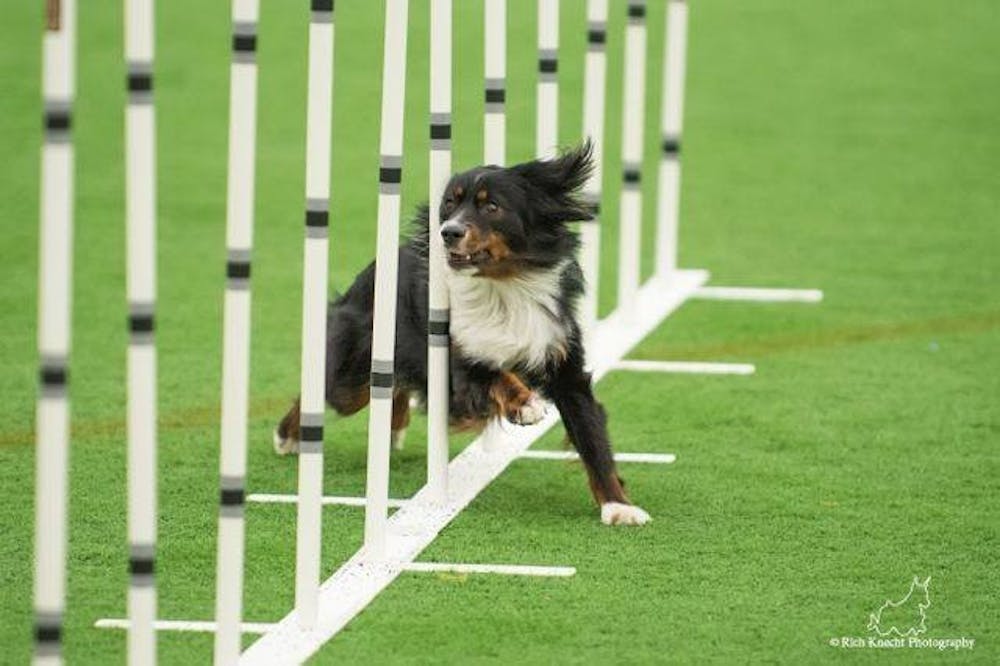AU professor Chip Gerfen never expected his service dog, Trudi, to take him across the globe, winning numerous awards in national and international agility competitions. But, that’s exactly what happened.
Gerfen, chair of the World Languages and Cultures Department in the College of Arts and Sciences, took in Trudi, a mini American Shepherd, after a doctor recommended a service dog to help him with his anxiety and panic attacks. Although Trudi was originally meant to solely be a service dog, her energetic personality led Gerfen to seek an exercise outlet for his puppy.
“When she was 12 weeks, I would take her for a two hour hike and she would come back to the house, lie down for five minutes, and then she’d get up and play,” Gerfen said. “We were dealing with this crazy, fast energetic little dog that needed an outlet.”
After a friend recommended agility training, Gerfen and Trudi began attending a training center in 2010 near Pennsylvania State University, where he used to teach. For Gerfen, agility training was difficult because of the techniques and communication skills that needed to be mastered.
“You have these foundational things you have to do well, and you need to really make sure that all of the skill sets that you need to navigate these courses is constantly reinforced by the right kind of training, but there has to be an extraordinary communication between the animal and the person to navigate the obstacle courses,” Gerfen said.
After three years, Gerfen started teaching at AU and took advantage of the agility training opportunities and resources that Washington, D.C. had to offer. Gerfen took private lessons with people who were able to help him improve his relationship with Trudi.
“She was always spectacular and always really quick to learn everything that I threw at her,” Gerfen said. “I was taking lessons with people who were able to work on me because she wasn’t the problem.”
After many lessons and training sessions, Gerfen realized the potential Trudi had and started entering her in agility competitions. It didn’t take long for Trudi to stand out and win competitions and awards.
“We started to have some spectacular results with her winning gold medals at the U.S. Open and with us making on the U.S. national team for various international events,” Gerfen said.
The U.S. has three organizations that each have individual competitions and championships for agility. Trudi has been on Team USA for each organization, traveling to the Netherlands and Spain, among other countries. Gerfen and Trudi will travel to Milan, Italy to compete in the IFCS World Agility Championship on April 25.
Trudi won a silver medal in the 2016 championship, but for Gerfen, winning a medal with Trudi in an international competition wasn’t his biggest accomplishment.
Trudi and Gerfen's silver medal performance at the 2016 IFCS World Agility Championship.
“For most people, their big goal is to get a lot of titles but strangely, the biggest accomplishment has been how much this dog has taught me,”Gerfen said. “She’s made me rethink a lot of things about teamwork and about failure.”
His time training with Trudi has taught Gerfen lessons that he now applies as an educator, he said.
“I failed so much for so long with her that it forced me to persevere to get better,” Gerfen said. “It’s made me think a lot about education and being a teacher and so much of what we do.”
Because she’s a service dog, Trudi accompanies Gerfen to class every day and has become an integral part of his classes. Christopher Perl, one of Gerfen’s students, said Trudi has been “very helpful in demonstrating specific linguistic differences in language.”
“For example, in our lesson about minimal pairs, Trudi showed that she would only react to ‘sit’ and not anything else, like ‘dit,’ ‘zit,’ or ‘bit,’” Perl said. “From my perspective, this pointed myself and my fellow classmates in the right direction of how to understand how minimal pairs work.”
For senior Tova Seltzer, having Trudi in her class with Gerfen was “always a highlight of the week.”
“I always felt my mood immediately brighten when I saw her come in,” Seltzer said. “During class, she was so well-behaved and quiet but would occasionally do something funny that would just relieve all the stress in the room from whatever we were each dealing with that day. I don't think there's any class that couldn't be improved by the addition of a tiny agility-champion dog TA."
Through his experience with Trudi, Gerfen has learned and passed on an important life lesson to his students.
“It’s about the journey,” Gerfen said. “Sometimes, you are so focused on certain obstacles, just going from problem to problem. It’s about learning and taking in emotions, it’s about the path.”
This story was originally published in the April print edition of The Eagle.





